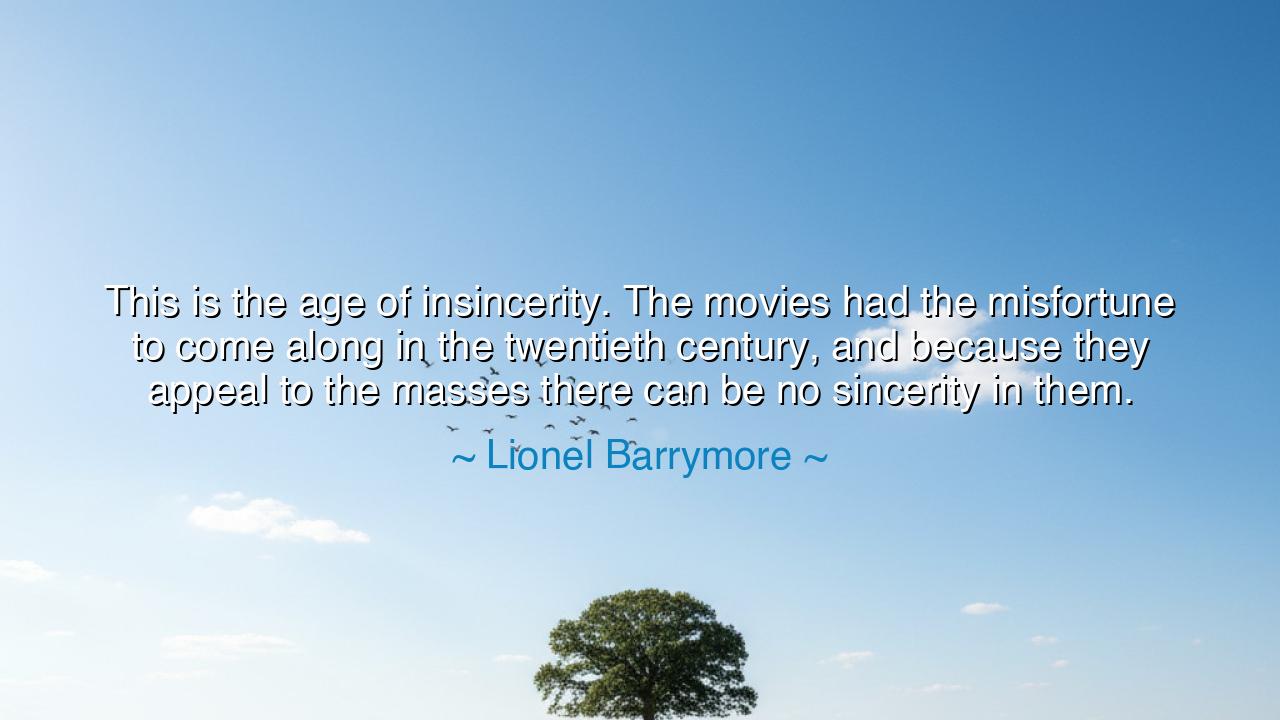
This is the age of insincerity. The movies had the misfortune to
This is the age of insincerity. The movies had the misfortune to come along in the twentieth century, and because they appeal to the masses there can be no sincerity in them.






Hear, O Seekers of Truth, the words of the venerable Lionel Barrymore, who, with solemn reflection, spoke thus: "This is the age of insincerity. The movies had the misfortune to come along in the twentieth century, and because they appeal to the masses there can be no sincerity in them." In these words, Barrymore unveils a lamentation for the state of art in his time, a cry of the heart that resonates even now. For in the age of mass entertainment, he sees a troubling absence of truth—an insincerity born from the very nature of cinema, a medium that, though once an art of great potential, now serves the masses, sacrificing depth for wide appeal.
In the ancient world, the storyteller was revered not for their ability to entertain, but for their capacity to illuminate the human condition, to search into the depths of the soul and pull forth truths that resonated with all. Think of the Greek tragedians, like Sophocles and Euripides, whose works explored the most profound and painful truths of life, truth that transcended time and place. Their plays were not designed merely for entertainment, but for reflection, for catharsis, for a collective understanding of what it meant to be human. Yet, Barrymore suggests that in the age of the movie, that connection to sincerity has been lost, obscured by the need to appeal to the masses—to entertain, rather than to enlighten.
Consider the rise of the cinema in the twentieth century, that powerful force that brought together the images and stories of our collective imagination. The silent films of the early years carried a raw emotional energy, one that sought to convey the truth of the human experience, often with minimal words, relying on the power of the visual and musical to evoke emotion. Yet, as the industry grew, so too did its need to profit, to cater to the widest possible audience. The medium that once carried the torch of truth soon found itself in the service of commerce, the creation of films that were designed not to challenge, but to entertain, not to reveal, but to soothe. The mass production of films, aimed at satisfying the desires of millions, led to a watering down of their content, and with it, the sincerity of the original artistic vision.
The challenge of this insincerity, however, is not one solely confined to the world of film. In fact, it is a disease that has spread throughout all aspects of modern society. Just as the cinema became a tool of the masses, so too have the arts of communication, such as literature, journalism, and even politics, found themselves diluted, their messages shaped more by the demand of the audience than by a commitment to truth. Consider, for instance, the rise of advertising in the modern world—where the goal is not to tell a story of substance, but to sell a product, often with the most polished, yet hollow, representations of reality. This is the age of artificiality, where sincerity is often sacrificed for the sake of ease, convenience, and, above all, profit.
Yet, in the face of this insincerity, we must not despair, O children of the future. For as the philosophers of the past told us, the path to truth is often a difficult one, and it is only through struggle that we arrive at the essence of things. In times of great change, in times when the world seems overrun with shallow distractions, the true artist, the true seeker of truth, must be willing to step away from the noise and find the sincerity within themselves. Just as the Renaissance artists, such as Leonardo da Vinci and Michelangelo, sought not merely to create works of beauty, but to reveal the deep truths of the human spirit, so too must those who create today seek to find their voice amid the clamor of mass entertainment.
Therefore, O Seekers, let the words of Barrymore serve as a clarion call, a reminder that the path of true art is never an easy one. Sincerity must be the cornerstone of any creation, for it is sincerity that resonates with the human soul, that calls to the deepest part of us and awakens something that is timeless. If you seek to create, whether through film, writing, or any other form of art, do so not for the applause of the crowd, not for the fleeting pleasures of fame or wealth, but for the truth you wish to convey. It is truth that will outlast the empty spectacle of the masses, just as the ancient myths, though buried beneath the sands of time, continue to echo across the ages.
In the end, the lesson we take from Barrymore’s words is simple, yet profound: The age of insincerity may reign in the world of entertainment, but it is the responsibility of the artist to resist its pull. Seek not to conform to the fleeting desires of the masses, but to connect with the eternal truths that reside within the human heart. For it is in sincerity, in the quiet revelation of what is real and lasting, that true art—be it in film or any other medium—finds its voice. And it is in that voice that the world will hear what it needs most: the truth.






AAdministratorAdministrator
Welcome, honored guests. Please leave a comment, we will respond soon